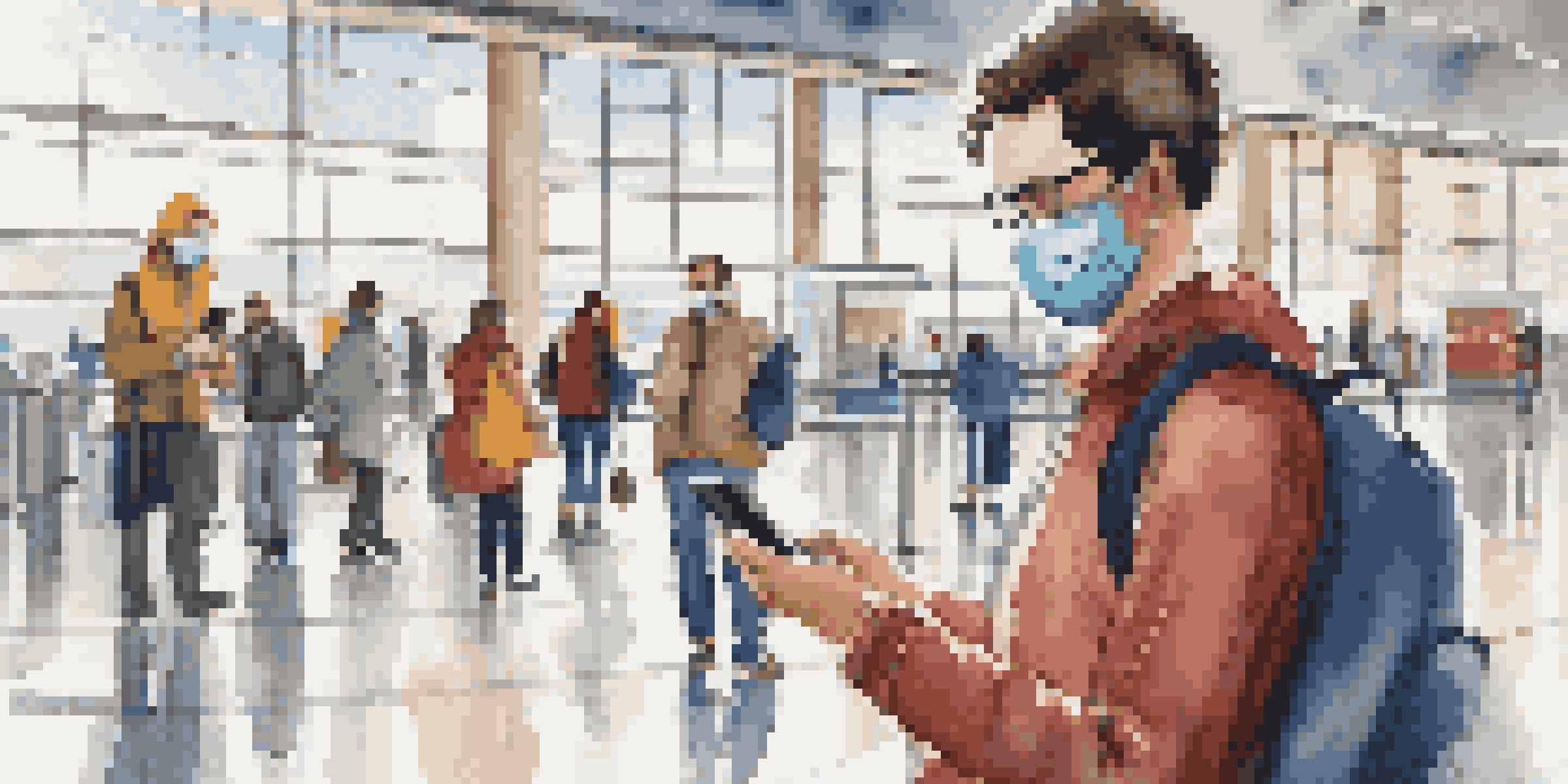Health Precautions for Travelers During Global Crises

Understanding Global Health Crises and Their Impact on Travel
In recent years, global health crises have reshaped the travel landscape. Events like pandemics can cause sudden changes in travel regulations, health recommendations, and even border closures. Understanding these factors is crucial for travelers to stay informed and safe during their journeys.
Traveling – it leaves you speechless, then turns you into a storyteller.
For example, during the COVID-19 pandemic, many travelers faced unexpected quarantines and testing requirements. This led to significant disruptions, emphasizing the importance of being adaptable and prepared. Keeping abreast of current events can help travelers anticipate changes and adjust their plans accordingly.
Ultimately, being informed means being proactive. It allows travelers to make better decisions about their destinations, ensuring a safer and more enjoyable experience, even in uncertain times.
Vaccinations: Your First Line of Defense
When preparing for travel during health crises, vaccinations should be at the forefront of your planning. Vaccines can protect against diseases that may be prevalent in certain regions, and they often change based on current outbreaks. Being up-to-date on recommended vaccines is essential for personal health and the health of those around you.

For instance, during the Ebola outbreak in West Africa, travelers were advised to get vaccinated against several diseases to mitigate risks. This highlights the importance of researching vaccination requirements specific to your travel destination. Consulting a healthcare provider before your trip can ensure you receive the necessary vaccinations.
Stay Informed on Travel Health
Being aware of global health guidelines and local regulations is crucial for safe and smooth travel.
In addition to routine vaccinations, travelers should also consider travel-specific vaccines. These may include vaccines for yellow fever or typhoid, depending on the region. By prioritizing vaccinations, you can significantly reduce your risk of contracting preventable diseases while traveling.
Staying Informed About Local Health Guidelines
Every destination has its own set of health guidelines, especially during global crises. Understanding these local regulations can help you navigate your travels more smoothly. This includes knowing about mask mandates, social distancing rules, and any restrictions on gatherings or activities.
Health is the greatest gift, contentment the greatest wealth, faithfulness the best relationship.
For example, some countries may require travelers to present a negative COVID-19 test before entry or proof of vaccination. Failing to comply with these guidelines can lead to denied entry or unexpected quarantines. Therefore, it’s vital to check official sources or consult travel advisories from reputable organizations.
Additionally, local health authorities can provide real-time updates on any emerging health threats or changes in regulations. Staying connected with these resources ensures that you have the latest information at your fingertips, allowing for informed decisions throughout your trip.
Packing Health Essentials for Your Journey
Packing the right health essentials can make a world of difference while traveling during a crisis. Consider including items like hand sanitizers, masks, and any personal medications you might need. These basics can help protect you from illness and keep you comfortable during your travels.
For instance, hand sanitizers with at least 60% alcohol can be a lifesaver, especially when soap and water are not available. Similarly, bringing a sufficient supply of masks can help you adhere to health guidelines while traveling. Each of these items contributes to a safer travel experience.
Vaccinations Are Key for Safety
Keeping up-to-date with vaccinations protects both personal health and the health of others during travel.
Moreover, don't forget to include a first-aid kit with band-aids, antiseptic wipes, and any other necessary supplies. Being prepared for minor health issues can prevent small problems from escalating into larger concerns, allowing you to focus on enjoying your trip.
Practicing Personal Hygiene While Traveling
Personal hygiene plays a crucial role in maintaining health during travel. Washing your hands frequently with soap and water or using hand sanitizer can significantly reduce the risk of illness. This simple practice is especially important in crowded places like airports and public transport.
Additionally, avoid touching your face with unwashed hands, as this can introduce germs into your system. Be mindful of where you place your belongings; keeping items like bags and phones clean can prevent cross-contamination. By adopting these hygiene habits, you can protect yourself and others around you.
Remember, practicing good hygiene isn’t just about protecting yourself; it's about being a responsible traveler. Your efforts can help reduce the spread of illness, contributing to the well-being of everyone in your travel environment.
Monitoring Your Health During and After Travel
Keeping an eye on your health before, during, and after travel is essential, particularly during a global health crisis. Be aware of any symptoms that may arise and know when to seek medical attention. This vigilance can help you address potential health issues early, ensuring a quicker recovery.
For example, if you develop symptoms like a cough or fever while traveling, it’s essential to self-isolate and contact local health authorities. They can provide guidance on testing and treatment options. Monitoring your health is a proactive step that can prevent further complications.
Pack Essential Health Supplies
Bringing health essentials like sanitizers and masks can significantly enhance your safety while traveling.
Moreover, upon returning home, consider self-monitoring for any symptoms for at least 14 days. This practice can help you detect any potential illnesses early and prevent spreading them to others. By being mindful of your health, you contribute to a safer environment for everyone.
Travel Insurance: A Safety Net During Crises
Travel insurance is an often-overlooked aspect of travel planning, but it can provide vital protection during global crises. A comprehensive policy can cover medical expenses, trip cancellations, and unexpected emergencies, ensuring that you are not financially burdened in times of need. It’s worth investing time to find a policy that suits your travel needs.
For instance, if you fall ill while abroad and need medical care, travel insurance can help cover the costs, preventing a financial strain. Additionally, many policies now include coverage for cancellations due to health crises, allowing you to recover some of your expenses. This peace of mind can make your travel experience much more enjoyable.

Before purchasing travel insurance, read the fine print to understand what is covered and any exclusions related to global health issues. By securing the right coverage, you can travel with confidence, knowing that you have a safety net in place.